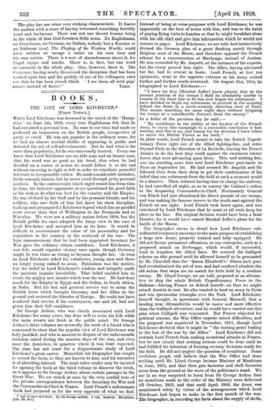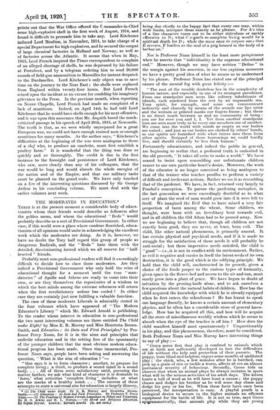BOOKS.
THE LIFE OF LORD KITCHENER.*
[FIRST NOTICE.]
WHEN Lord Kitchener was drowned in the wreck of the ' Hamp- shire ' on June 5th, 1916, every true Englishman felt that he had sustained a personal loss. No man in our time had made so profound an impression on the British people, irrespective of party or creed. He was not popular in the ordinary sense, for he had an almost morbid dislike of appearing in public and
detested the art of self-advertisement. But he had what is far rarer than popularity, for he was universally trusted. Every one knew that Lord Kitchener was an able man and an honest man, that his word was as good as his bond, that when he had decided on a course of action he would follow it to the end without swerving to right or left in order to conciliate powerful interests or irresponsible critics. He made considerable mistakes, for he was only human, but he never erred through petty personal motives. In the controversies which raged round him from time to time, his bitterest opponents never questioned his good faith or his wish to do what was best for the country and the Empire. He was idolized by his Staff and by his personal friends, and his soldiers, who saw little of him but knew his stern discipline, built up and propagated a Kitchener legend which has no parallel more recent than that of Wellington in the Peninsula and at Waterloo. We were not a military nation before 1914, but the British public for once adopted the Army view in the case of Lord Kitchener and accepted him as its hero. It would be difficult to overestimate the value of his personality and his reputation to the country at the outbreak of the war. The bare announcement that he had been appointed Secretary for War gave the ordinary citizen confidence. Lord Kitchener, it was felt, would organize victory once again, though Germany might be ten times as strong as laymen thought her. As soon as Lord Kitchener asked for volunteers, young men and those no longer young rushed to arms. Patriotism was the motive, but the belief in Lord Kitchener's wisdom and integrity made the patriotic impulse irresistible. That belief enabled him to create the mighty new Armies which won the war. He had done much for the Empire in Egypt and the Sudan, in South Africa, in India. But his last and greatest service was to array the British hosts which brought Germany and her Allies to the ground and restored the liberties of Europe. He could not have rendered that service if his countrymen, one and all, had not given him their full confidence.
Sir George Arthur, who was closely associated with Lord Kitchener for many years, has done well to write his Life while the main events are fresh in the public mind. Sir George Arthur's three volumes are avowedly the work of a friend who is concerned to show that the popular view of Lord Kitchener was fully justified, and who is anxious to dispose of the unfavourable criticism raised during the anxious days of the war, and even since the Armistice, in quarters where it was least expected. The time has not come for a dispassionate study of Lord Kitchener's great career. Meanwhile his biographer has sought to record the facts, as they arc known to him, and his narrative is of absorbing interest. The most sober reader may be excused for opening the book at the third volume to discover the truth, as it appears to Sir George Arthur, about certain passages in the Great War. We are struck at once by the very cordial tone of the private correspondence between the Secretary for War and the Commander-in-Chief in France. Lord French's unfortunate book had prepared us for the very opposite of what we find.
• Life of Lord Kitchener. By Sir George Arthur. S vols. Loudon : Od. net.] Instead of being at cross-purposes with Lord Kitchener, he was apparently on the best of terms with him, and was in the habit of paying flying visits to London so that he might breakfast alone with his old chief and give him information which he would not entrust to paper. Lord Kitchener, we are told, had instinctively divined the German plan of a great flanking march through Belgium west of the Meuse, and therefore opposed the French
scheme for a concentration at Maubeuge, instead of Amiens. He was overruled by Mr. Asquith, at the instance of the experts, but the event proved him right. The Allies, having advanced too far, had to retreat in haste. Lord French, at first too optimistic, went to the opposite extreme as his Army retired further and further south-westward. On August 31st, 1914, he telegraphed to Lord Kitchener :—
" I have let him [Marshal Joffre] know plainly that in the present position of my troops I shall be absolutely unable to remain in the front line as he has now begun his retirement. I have decided to begin my retirement to-morrow in the morning behind the Seine in a south-westerly direction west of Paris. This means marching for some eight days without fatiguing the troops at a considerable distance from the enemy."
In a letter of the previous day he said :- " My confidence in the ability of the leaders of the French Army to carry this campaign to a successful conclusion is fast waning, and this is my• real reason for the decision I have taken to move the British Forces so far back."
In plain words, Lord French meant to take the British Expedi- tionary Force right out of the Allied fighting-line, and retire beyond Paris in the direction of La Rochelle, leaving the French Armies to do the best they could against the enormous enemy forces that were advancing upon them. This, and nothing less, was the startling news that sent Lord Kitchener post-haste to Paris on September 1st. He had aroused Mr. Asquith and Sir Edward Grey from their sleep to get their confirmation of his belief that our retirement from the field at such a moment would be a disaster. Then, without having time to change his uniform, he had travelled all night, so as to convey the Cabinet's orders to the despairing Commander-in-Chief. Fortunately General von Kluck had just abandoned his direct pursuit of our troops, and was making his famous swerve to the south-east against the French on our right. Lord French took heart again, and was convinced by Lord Kitchener that he must at all costs keep his place in the line. His original decision would have been a fatal blunder, for it would have ruined Marshal Joffre's plans for the battle of the Marne.
The biographer shows in detail how Lord Kitchener sub- ordinated temporary successes to the main purpose of establishing a large new Army, properly trained and fully equipped. He did not favour premature offensives, or any enterprise, such as a proposed attack on Zeebrugge, which would, if successful, tend to lengthen the Allied lines. He resisted the Gallipoli scheme on this ground until he allowed himself to be persuaded by Mr. Churchill that the ' Queen Elizabeth's' fifteen-inch guns had revolutionized the art of war, and had rendered obsolete the old axiom that ships are no match for forts held by a resolute enemy. Mr. Lloyd George, we are told, proposed as an alterna- tive to ship the whole British Expeditionary Force to the Balkans—leaving France to defend herself—so that we might attack Austria in rear. He also wanted to land an army in Syria and win spectacular triumphs over the Turk. Lord Kitchener himself thought, in agreement with General Maxwell, that a landing near Alexandretta would be easier and more effective than the Gallipoli adventure, and he would have carried out this plan when Gallipoli was evacuated. But France objected for political reasons, the War Office experts raised difficulties, and the proposal was negatived in November, 1915, though Lord Kitchener declared that it might be " the turning-point leading to the loss of the war by the Allies." Lord Kitchener did not restrain Lord French from making occasional attacks in France, but he saw clearly that nothing serious could be done until he had fulfilled his intention of forming seventy divisions ready for the field. He did not neglect the question of munitions. Some credulous people still believe that the War Office had done nothing until Mr. Lloyd George became Minister of Munitions in June, 1915, and that then gun factories and shell factories arose from the ground at the wave of the politician's wand. We are in no way surprised to learn from Sir George Arthur that no munitions made to the order of the Ministry were delivered till October, 1915, and that until April, 1916, the Army was munitioned solely by virtue of the arrangements which Lord Kitchener had begun to make in the first month of the war, The biographer, in recording the facts about the supply of shells, points out that the War Office offered the t.ammander-in-Chief some high-explosive shell in the first week of August, 1914, and found it difficult to persuade him to take any. Lord Kitchener induced Lord Moulton, in November, 1914, to take charge of a special Department for high explosives, and he secured the output of large chemical factories in Holland and Norway, as well as of factories across the Atlantic. It seems that when in May, 1915, Lord French inspired the Times correspondent to complain of an alleged shortage of shells, he was depressed by his failure at Festubert, and by a telegram ordering him to send 20,000 rounds of field-gun ammunition to Marseilles for instant despatch to the Dardanelles. Lord Kitchener's only object was to save time on the journey to the Near East ; the shells were replaced from England within twenty-four hours. But Lord French seized upon the incident as an excuse for confiding his imaginary grievance to the Press. In the previous month, when reporting on Neuve Chapelle, Lord French had made no complaint of a lack of munitions. Indeed, on April 14th he had told Lord Kitchener that he would have shells enough for his next offensive, and it was upon this assurance that Mr. Asquith based the much- criticized passage in his speech of April 20th, 1915, at Newcastle. The truth is that, as we were wholly unprepared for a great European war, we could not have enough trained men or enough munitions for many months. As the author says, " Kitchener's difficulties at the beginning of the war were analogous to those of a chef who, to produce an omelette, must first establish a poultry farm." It is wonderful that the thing was done so quickly and so thoroughly. The credit is due in the first instance to the foresight and persistence of Lord Kitchener, who saw, more clearly than any of his colleagues, that the war would be long and would absorb the whole energies of the nation and of the Empire, and that our military tasks must be planned on the grand scale. We have only touched on a few of the interesting questions discussed by Sir George Arthur in his concluding volume. We must deal with the earlier volumes next week.



































 Previous page
Previous page